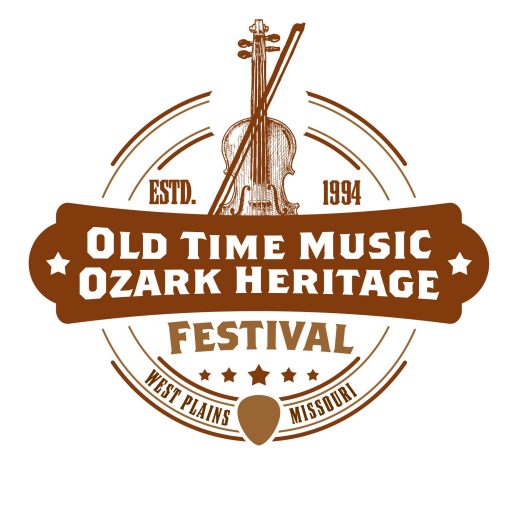This page will be used to archive the tribute articles published for those artists we have lost. These friends are dearly missed, but their passion will not be lost.
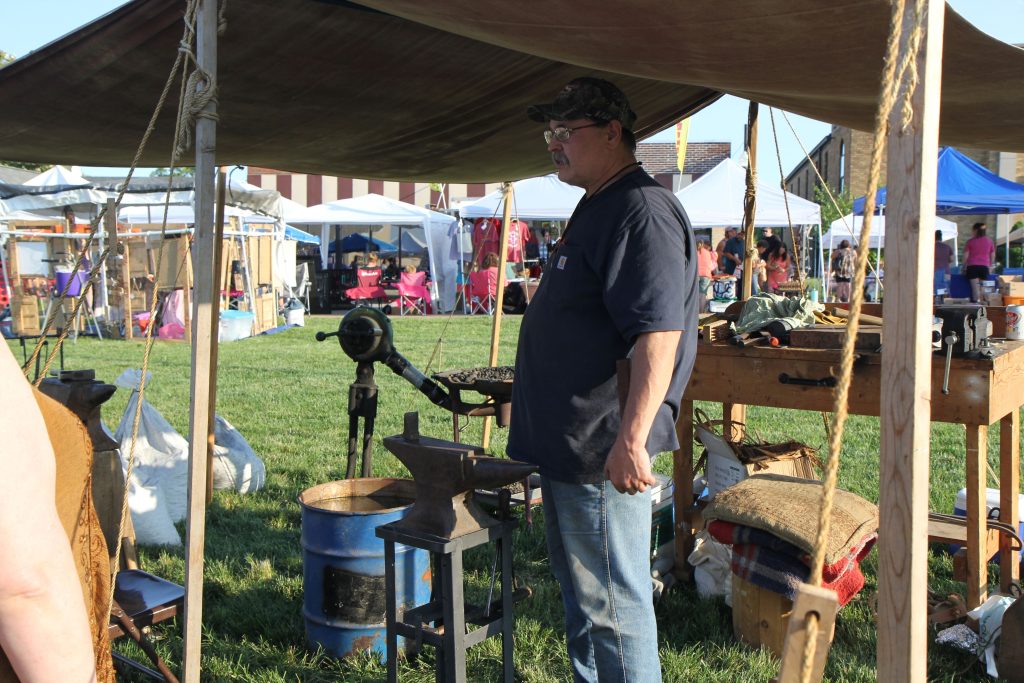
Harry Joe McKee, Jr.
Harry McKee was often the blacksmith at our Old-Time Music, Ozark Heritage Festivals over the years. We are sorry to hear of his passing. His presence and unlimited stories will be missed.
A Celebration of Life Service for Harry Joe McKee, Jr., 62, West Plains, Missouri, will be held from 3:00 until 5:00 p.m., Saturday, December 9, 2023, at Smith Chapel Church, East Highway 160, West Plains.
Mr. McKee went to be with the Lord Saturday, November 18, 2023, at Ozarks Medical Center.
He was born February 23, 1961. Harry was a special man; always making friends and family feel loved and was there for them. His favorite things were being a blacksmith and making knives. Harry will be missed so very much.
He is survived by his wife, Christie; one son, Brian; one daughter, April; three grandchildren; one sister, Gabriele; brother, Jim; and many other family and friends.
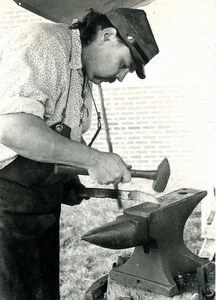
Early Harry McKee – Blacksmith
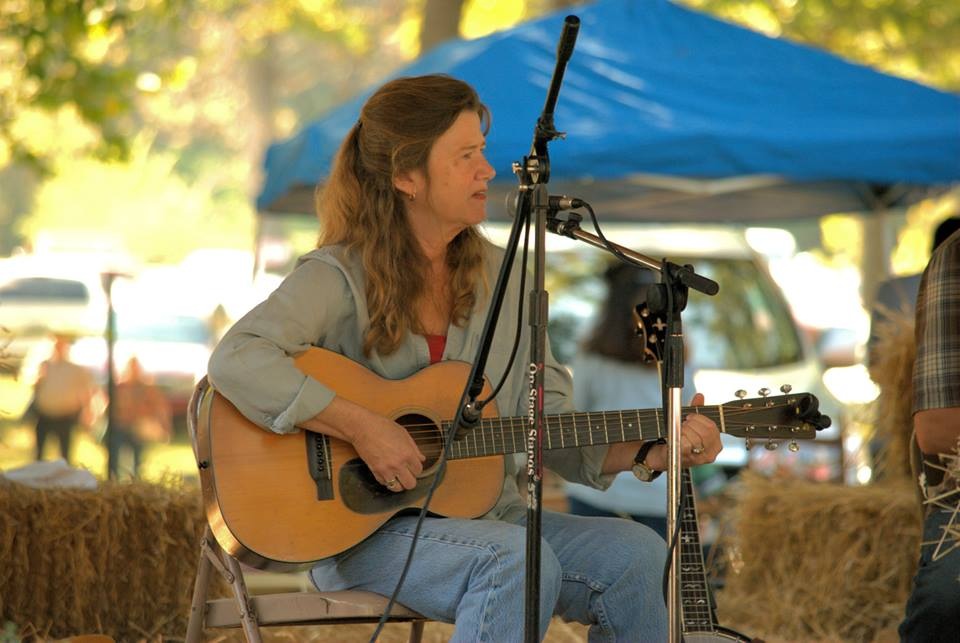
Kim Lansford
In the midst of the celebrations of the Ozarks at the Smithsonian Folklife Festival in D.C., we learned the sad news that Ozark musician Kim Lansford had died on Sunday, July 2, 2023. In anticipation of that day, our friend and former intern Sam Kendrick asked to write the tribute that appears below. Readers will understand why it was important for him and why we readily agreed. We share Sam’s tribute to Kim Lansford here and send love to all her miss and mourn her.
A tribute to Kim Lansford (August 9th, 1955 – July 2nd, 2023)
Hello my friends.
It is with a heavy heart that I must tell you of the passing of Kim Lansford. She left us on the morning of July 2nd, around 2.30 in the morning. We lost another great musician and friend. Kim was my mama’s best, and oldest, friend. Which made Kim more like an aunt to my brother and me than anything else. They grew up together in the same neighborhood in Kansas City, two doors down from each other, starting at the age of nine. They went to school together, they shared a love of music, and generally loved getting up to shenanigans together. Their friendship endured through good times and bad, fading in and out of touch, as all long-term friendships do, but ultimately finding each other again in the past 20 years and falling back into the same natural friendship that endured through their lives. I know we all have our own stories and memories of Kim, but I wanted to share my side of the Kim Lansford we all know and love.
Kim shared her musical talent and voice with the world. She brought the joy of old-time music to people, not just throughout the country, but to people around the world. She started with the piano when she was young, but she was in college when she started making the transition to Old Time Music. Then she moved to the hammer dulcimer, and from there into rhythm guitar and singing. Her impact has been profound. Kim and her husband Jim even played a part in the movie Winter’s Bone, which starred Jennifer Lawrence. She had, and still has, friends across the country that will always remember her fondly. Friends who will always look back and say that she was a wonderful person who cared about everyone she met and played music with. She was an incredibly talented and influential musician, even to my family and me. My brother plays rhythm guitar styled off the way she played, because it was steady, reliable, and something to be trusted. My colleagues and friends remember her as an icon to Old Time Style musicians. Kim was always willing and happy to give advice and talk about different versions or names of songs and tunes. Personally, I learned more about music from her than I did in my four and a half years of undergraduate studies. For those of us who knew her, we all have stories about music, festivals, fiddle contests, conventions, or just friendly visits with her. Every moment was a joy to be around her while playing music, laughing, discussing styles and musicians, talking about how one chord fit into a song and how it might be altered so it could enhance, not just the player’s experience, but of everyone else listening. Some of my favorite moments are when she would just stop playing and listen to the universe around her and the music that echoed through it. Kim was a true musician, and everyone who ever knew her knows it.
But for my family and me, when it came to Kim, music was ancillary. Sure, we would talk about it, or play late into the night, but it wasn’t the most important thing. Through the holidays, special occasions, or even just visits, music still came second. Albeit a close second, but still second. I don’t mean to downplay her influence as a musician or a person, but playing music together wasn’t what was most important when we were all together. She was just Kim. Someone to confide in, someone who shared a love of cooking with my mama and sharing food with others, and someone who would always laugh at the absurdity of life. Even if there was nothing to be said, there was still a comfortable silence to be found. She was family. She was there when my grandfather died and was a rock for all of us to lean on. When it comes right down to it, Kim was someone to sit at the table with and just talk; about anything, everything, or even just nothing at all. Sure, things could get deep, but it often came down to seeing which one of us could make the others laugh harder, and the deeper into our cups we got, the funnier everything got. She had an amazing sense of humor that was sophisticated, yet crass, somber, yet obscene, and reasonable, but absolutely absurd. She found a way to laugh at everything. During one of the many visits, we made to her in the past few months, my family and I visited her in the care facility she was staying in in Springfield. Now, I don’t know about you, but I find care facilities to be absolutely dismal places, but even in that dimly lit room, we found things to laugh about. The quality of the food was one of the things. She called it “pre-chewed”, so she didn’t even have to work that hard to get it down. Another thing we got hysterical about was the fact that on the whiteboard on the wall above her bed had her name written in quotation marks. So of course, we started calling her “Kim” whilst using air quotes, which quickly spiraled out of control and every other subject we talked about ended up with air quotes, each time being funnier than the last. I don’t think there was a single time we ever walked away from a visit with Kim when our faces didn’t hurt from laughing so much.
Kim was also a great cook. Even if it was a lentil salad, which I am on record as being vehemently against everything lentil, I enjoyed the food. She was great with salads, likely the only person who makes a better salad than my mama (don’t tell her that, though), and while her meals often featured vegetables more than meat, she made one of the best lamb stews I’ve ever had. Even when cooking, though, she imbued the process with humor. Making fun of techniques like “massaging the kale” or something else ridiculous like that. You may not have been able to taste the humor, but you knew it was still there because as anyone worth their salt in the kitchen knows, there is emotion in food, imbued by the chef and adding just that much more to the meal. Of course, with supper, came drinks. She always had various options to offer, from cheap beer, to whisk(e)y, to fancy wine, Kim made sure to have something for everyone. Lord knows how many times my brother and I descended onto her liquor basket to sample all of the whiskeys she had; pretending to have sophisticated palates, sniffing and making noises at the expensive scotches she kept, before we inevitably turned to the Jameson, because really, you can’t beat a simple and friendly Irish Whiskey that makes no demands on your taste buds other than enjoying the moment and having a good time. Of course, we reciprocated in turn when she came to visit, making sure that we had, at the very least, a bottle of Johnnie Walker Black on the counter for her, because that was her favorite. Yes, I’ll admit, we helped her once the bottle was cracked open and more often than not the bottle was empty at the end of the night, and once the next day dawned and we managed to drag our sorry butts out of bed at the crack of noon, she was always there to make fun of us while we nursed our hangovers and blearily ambled about the house. Kim was there for Thanksgivings, Christmases, Easters, always made sure to wish us happy birthday, and always up for a visit. She would help cook the holiday meals, bring food, bring drink, bring her deep interest in every topic, and bring her incredible sense of humor.
If you ask me what I’ll miss most about Kim, I don’t really have an answer for you. I could say that I’ll miss watching her and my mama laugh hysterically while they reminisced about past shenanigans, that I’ll miss sitting and talking with her in quiet moments, that I’ll miss listening to her and my brother play music together and talk about old English Folk Songs, or that I’ll miss listening to her and my dad dissect one specific piece of music that was recorded in the 1920’s. But to answer with a single thing would be impossible because she was all these things and more. I won’t miss the big things and the grand gestures, like sessions or the sudden quiet in the room when she pulled out her Gibson to start to play. I’ll miss offering her my arm as we walk up the hill on her property up to the observing platform that she had built on the highest point of her hill. I’ll miss emptying the barrels that collected rainwater in the fall, because they would crack come winter if they were still full of water. I’ll miss going out to check on sheep with her as we rambled on about things that didn’t matter, while the rest of my family moved on ahead of us with the mission to get things done. All of these are true. They are moments and memories that stand out in my mind; images that are forever ingrained into the revolving picture show that resides within my brain.
A lot of times when we lose a loved one, they become perfect in our minds. The truth of the matter is that none of us are perfect. We all have our flaws and differences within our relationships, but to love someone is to love all of them, including their flaws and imperfections. When we gloss over the sticking points in a person’s life, we lose what I believe to be the most important parts of that person’s life. They are what makes someone relatable. I loved….no, I love Kim. As does my family, as I hope all of you do who might read this. There’s this post somewhere on the internet that speaks of some guy who asked an older man about grief and the loss of loved ones. To summarize, the older man responds that grief comes in waves and leaves scars, those waves will seem overwhelming at first, but will gradually become smaller and hit softer. I held onto that idea for several years after the death of my grandfather, until I watched an interview between Stephen Colbert and Andrew Garfield. Garfield was speaking about the recent loss of his mother and said these words: “I hope this grief stays with me, because it’s all the unexpressed love I didn’t get to tell her.” It’s probably an unexpected take on loss, but also staggeringly true. Grief doesn’t come in waves, yes it leaves scars on our souls and hearts, but grief is a constant thing that we must learn to live with. There will be reminders that will bowl us over, that might feel like waves, but really we just find a place to put it while we work to assimilate it into our minds, because it never really leaves us. We just get used to the pain of the loss of someone we’ll never see again in this life.
To return to the question of what I’ll miss most about Kim, there is no single answer. I’ll miss a lot about her, but mostly? I’ll just miss Kim.
I hope that those of you who are mourning the loss of Kim are able to find a moment of peace to look back on the memories that you share with her. If you get the chance in that moment of peace, pour yourself a dram of Johnnie Walker Black and send a toast to Kim out to the universe. For now, I’ll leave you with this, words of the last song my brother and I got to sing for her, The Parting Glass.
“So since it falls unto my lot, that I should rise and you should not. I’ll gently rise and softly call, good night and joy be with ye all.”
Once again, don’t let the music stop.
Sam Kendrick MFAP former intern
Nathan Lee McAlister
I knew I needed to take time to sit down and process my thoughts, and to try to express those thoughts in a way that would do justice to Kim Lansford . In the end, words truly cannot convey the impact Kim made on me as a person and a musician, along with countless others in our region and abroad. Words won’t convey the loss our community will face with her absence. Of course Kim was a true scholar of traditional music. She was always the one we wanted playing guitar in the circle. Her singing and knowledge of traditional ballads soared over many others in the Ozarks. She was in a league of her own. But what I will remember most about Kim is how she was such a good friend to so many of us. I will miss her cooking, her laughter, her keen sense of art and style, and her resilience as a true Ozarker. She had a unique blend of ruggedness and sophistication that made so many people feel welcome around her. She was such a good friend, and I will miss her so very much.
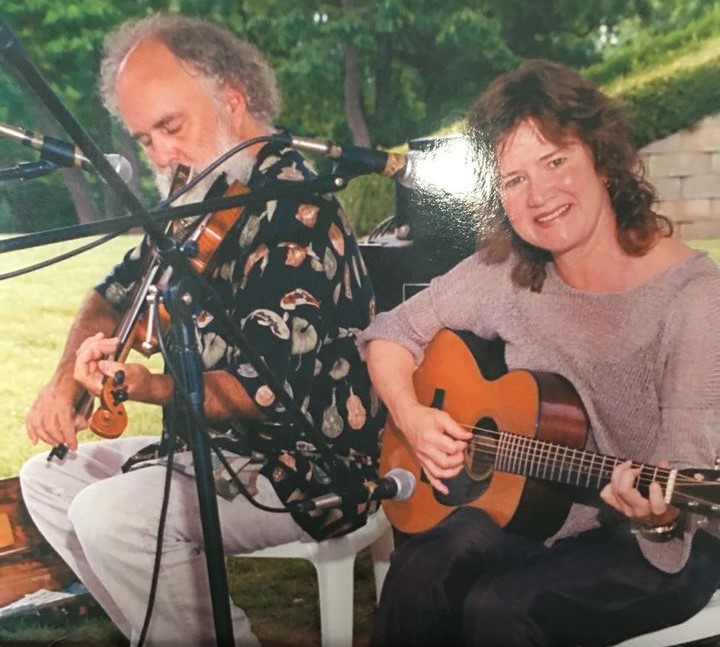
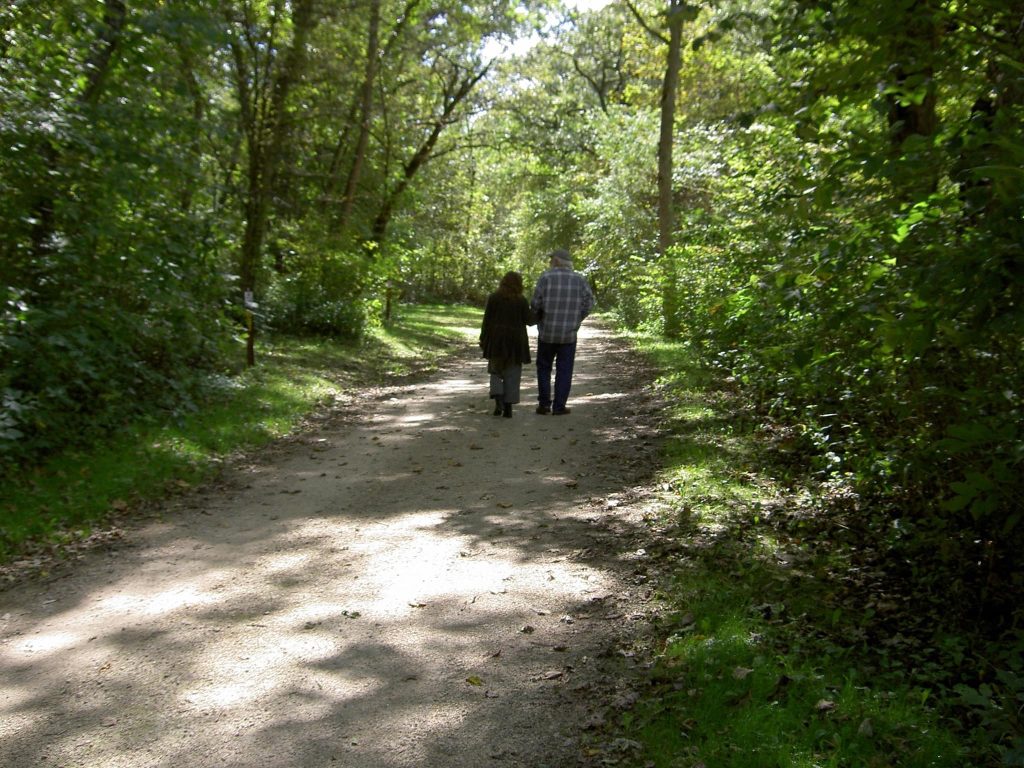
Lisa Higgins 7/2/23
Thanks to Kim and Jim Lansford, this record got me through many a long drive and some sad times.
It’s such sad news that Kim passed this morning, especially as so many friends are in DC playing the music that brought them together often.
Thank you, Kim, for the music and your inspiration to so many. Much love to all who love her.

Bernard Allen
Bernard Allen, Luthier – TAAP Master Artist: 1991 and 2008, 2017
Bernard Allen (Naylor), a retired educator and former mayor, participated in Missouri’s apprenticeship program four times. In 1987, Mr. Allen apprenticed in woodworking with Dr. James Price. Since the apprenticeship over 30 years ago, Bernard Allen has taught four apprentices the art of luthiery – building stringed instruments – in Missouri’s Traditional Arts Apprenticeship Program.
In his spare time, he enjoyed learning a new instrument – he started with the banjo, and also learned the fiddle, guitar, mandolin and anything with a string, all without reading a note. He played bluegrass for years and several events in the area with his band Buzzard Run. So it’s fitting that the last thing he did on this earth was play music for others to enjoy. He was also a master craftsman and attained that status and was honored by the University of Missouri for his work in handcrafted fiddles and mandolins. Bernard also served as the mayor of Naylor from 2008 to about 2020.
With all of his accomplishments the thing he was most proud of was his kids and grandkids. He traveled the state watching them play their favorite sports and activities.
In lieu of flowers please donate to the Bernard Allen memorial scholarship fund for Naylor high school students at Peoples Community Bank in Naylor, MO. Checks can be made out to the Bernard Allen memorial scholarship fund.
Allen was quoted as saying, “Instrument making combines two of my favorite activities, woodworking and music.”
Shared from the Missouri Folk Arts Program:
“Master luthier Bernard Allen of Naylor, Mo. passed away Sunday, 4/16/2023. Missouri Folk Arts has been honored to work with Mr. Allen many times over the years, first when he apprenticed to Doc James E. Price in 1987 to learn traditional wood joinery. Their friendship started before and continued all these years.
Mr. Allen took his joinery skills and applied them to luthiery, crafting fiddles and mandolins. In 2006, he generously contributed his wisdom to our 2007 traveling exhibition “Work is Art and Art is Work,” as one of six featured luthiers. The portrait of him below posed with his fiddle is by photojournalist Rita A. Reed, who traveled around Missouri with Folk Arts Specialist Deb Bailey to document the six luthiers.
Mr. Allen also used his talent as a luthier and as a longtime educator to teach his own apprentices: Luke Medley (1991); Danyel Nobles (2008); Alex Clayton (2017); Robert Lewis (2018); and Chad Eads, pictured below (2022).
In 2019, Mr. Allen sat with Deb Bailey during Ripley County Heritage Days for his “Then & Now: Apprentice Journeys” interview to discuss his path from apprentice to master artist. Followers can view an edited version of that interview on our YouTube channel.
We send our most sincere condolences to the Allen family, as well as all those whose lives were touched by Mr. Allen as an educator, mayor of Naylor, member of the bluegrass band Buzzard Run, and a regular at local music jams, fairs, and festivals.”
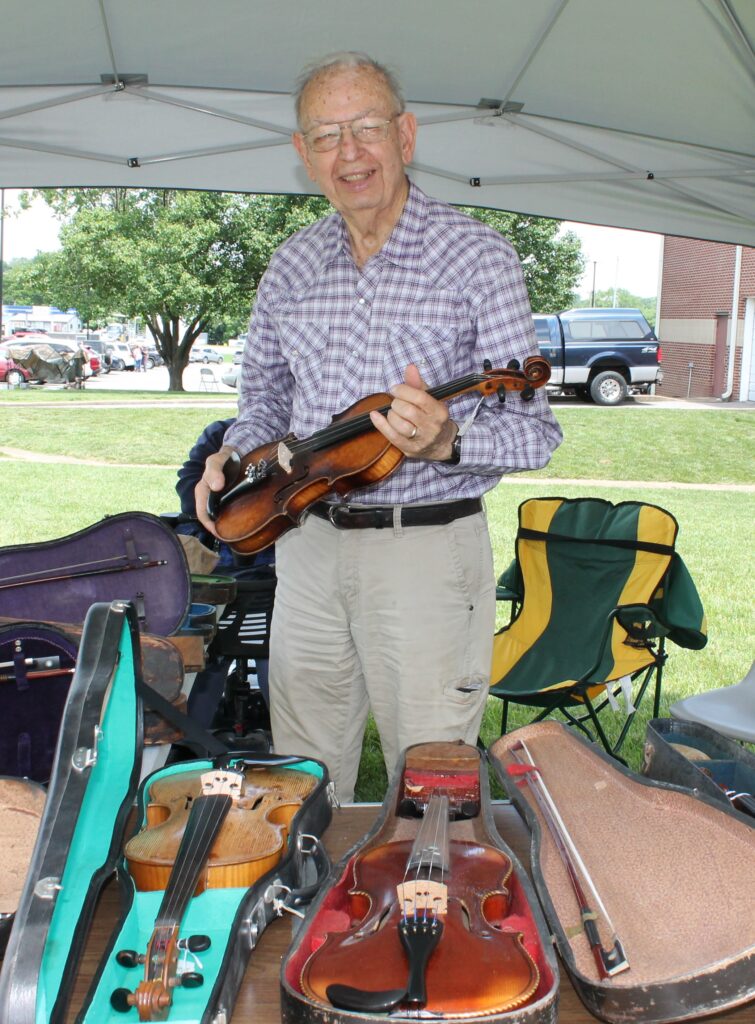
Dr. Ed McKinney
Dr. McKinney participated in many ways over the years at the Old-Time Music Festival. Always willing to lend a hand when asked, and passionate about passing along the old-time music traditions, he is greatly missed.
Dr. Edgar McKinney passed away Sunday, Oct. 3, 2021, at his home in West Plains. He was born June 25, 1935 in rural Texas County. He attended the one-room Grandview School, then graduated from Cabool High School.
He served in the Army from 1958 to 1960, and after returning home, he married Blanche Scheets June 18, 1960, then began his college career. After obtaining his bachelor’s degree, he taught one year at Jarrett Junior High School in Springfield, then transferred to Glendale High School, where he taught 10 years. During that time, he also completed his master’s degree in history.
In 1967, their son, Fredric Duane, was born, and in 1971, a daughter, Laura Elizabeth, was born, but lived only five days. In 1974, he and his wife and son moved to Yukon, Mo., where they lived for 13 years. While there, they established a business, Yukon Antiques and Music, which focused primarily on bluegrass musical instruments. He became known for building guitars and mandolins, and for doing outstanding repair work on instruments. They were honored to have a Martin Guitar dealership, and the highlight of many vacations was visiting the Martin factory in Nazareth, Penn.
He loved playing the guitar, and over the years, he formed several bands. One of them included four talented young musicians, and they were chosen to perform at a Lewis and Clark exhibition for the Missouri State Fair. His last performance was at Bull Shoals State Park in April, where his band played for a traveling group of RV-ers.
After 13 years in Yukon, he was involved in operating the shop, teaching at two universities in the evenings, farming, serving occasionally as a substitute mail carrier, as well as serving on the school boards for Raymondville School and for the Texas County Library System. Finally, his doctor advised him to choose just one occupation, and he chose teaching as his favorite, but he decided he wanted to earn his PhD. in order to do so. So, they sold things at the farm and shop, (although they kept the property for a few more years), moved back to Springfield, where Blanche found employment at Hillcrest High School, and for the next three years, he went to the University of Missouri in Columbia on Mondays, and often returned to Springfield on Fridays. After those three years of classwork, he spent the next year writing his dissertation, and in 1990, was awarded the PhD.
After finishing his degree, he taught for a time on the Missouri State University campus in Springfield, but in 1994, he accepted a position as head of the history department at the West Plains branch of Missouri State University. He loved that position, and stayed for 21 years, retiring when he was 79.
Roberta Ross-Fisher from Saint Clair, MO, wrote on Oct. 8, 2021: While attending high school in Summersville back in the mid-1970s, our American History teacher left in mid-year and Mr. McKinney became our substitute teacher. That was many decades ago, but to this day I remember how he made history come alive for this adolescent, and it helped me to develop a lifelong passion for the beauty and richness of our past. Even more than content knowledge, I remember him as a genuinely nice person, one who treated his students with respect and kindness. I went on to earn multiple advanced degrees and became a career-long educator but can honestly say that Ed McKinney was and remains to this day my favorite teacher. I can think of no higher compliment to offer; his impact will continue to be felt for generations.
Randall, Teresa, and Matthew Romans from West Plains, wrote on Oct. 4, 2021: Ed will be missed but don’t you know there’s a jam going on up there with Dean and Roger and so many others.
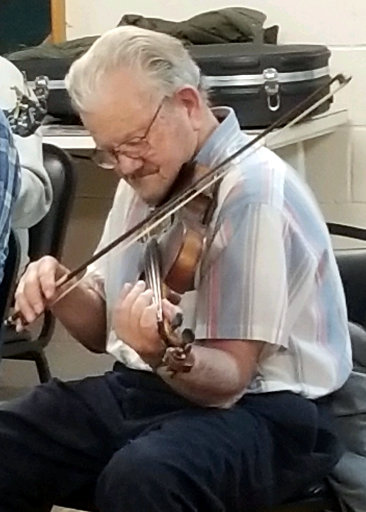
Roger Williams
This remembrance of Roger Williams is a contribution from Howard W. Marshall, Professor and Chairman Emeritus in the Department of Art History and Archaeology at the University of Missouri, Columbia. He has written two books on the old time fiddlers of Missouri.
Roger A. Williams, one of the Midwest’s foremost bluegrass fiddlers, died in West Plains, Missouri, December 15, 2019. He was 84.
Williams was born in 1935 on the family farm between Cureall and Pottersville in the gently rolling landscape of Howell County in southern Missouri. Roger descended from Scottish, English, Irish, and Cherokee Indian people, and there are many musicians in the clan.
Roger Williams began playing violin at age six, inspired by his elders, the older children in the family, and the excitement of house dances and the music of other fiddlers in the neighborhood. Among musicians in the family were his maternal uncle, Clyde Briggs, his father, various older cousins, and his three older brothers, Joe (mandolin), John (guitar), and Paul (bass). Roger’s father, David Noah (D.N.) Williams, played upright bass and guitar. Roger’s younger brother, Clyde (aka Dan O’Day), is a bluegrass fiddler active in The Greater Ozarks Bluegrass Society and performs with banjoist Roger Matthews in the duo, Fiddle and Banjo. Most of the family were singers as well as instrumentalists. A cousin of D.N.’s, Walter (Bert) Williams, was an old-time fiddler, and, with cousin Floyd Williams (old-time five-string banjo) and D.N. on guitar, played square dances in the region.
Roger’s first fiddle tune was Beautiful, Beautiful Brown Eyes, which his grandfather John Williams often sang. Growing up during the Great Depression in the late 1930s, and during World War II, he made do with a borrowed violin from his uncle Emmett Williams. His first experience as a semi-professional musician was on live radio at age 15 in 1945, on KLCN AM, Blytheville, Arkansas, where his two older brothers Joe and John, were performing with Donald Howard and the Smilin’ Hillbillies
Williams competed in his first fiddle contest in 1948, a two-night affair held at the Armory in West Plains, and won the junior division. “Won twenty dollars!” Contestants played only one tune, and Roger’s was Fire on the Mountain. Rules stated that fiddlers could have one accompanist, and Roger’s brother John played guitar for him. Why did Roger pick Fire on the Mountain as his tune? “Probably because it’s fast, and I like Curly Fox’s fiddling (Fox popularized the tune on Grand Ole Opry broadcasts).” What did the folks at home think when Roger won and came home with twenty dollars? “They was beside themselves.”
In 1954, Roger graduated high school and began performing with “the Collins boys.” They played dances (combinations of square dancing and round dancing) at some of the rough venues typical of the era, such as at Crazy Cabins, a highway junction tavern and dance hall where most Saturday nights saw at least one drunken fist fight break out among the revelers.
“Bluegrass kind of got me hooked” was how Williams described his move from old-time square dance fiddling to bluegrass as a teenager. Some fiddlers, like Roger, gladly vacated the demanding role of square dance fiddler in favor of being a role player in an ensemble. In the 1940s, Williams listened to the Grand Ole Opry and liked Bill Monroe’s music, as well as Flatt and Scruggs after they left Monroe to form their own band. Roger’s list of professional fiddlers he admired includes familiar names – Curly Fox (“He was smooth as silk.”), Benny Martin (“a genius on the fiddle”), Tommy Jackson, Dale Potter (“far ahead of his time”), and Kenny Baker. Williams knew Potter (a fellow Missourian) and sometimes performed with him. Roger’s own fiddle style incorporated elements from all those players, and, like theirs, it emphasizes smooth bowing, and rich, perfect double-stops.
“I tried to incorporate all the different styles. (But) I didn’t follow nobody. I took a little bit here, and a little bit there. Because if I played it just exactly like somebody else, they could listen to the real thing, they wouldn’t have to listen to me. I tried to play it as smooth and as close to the melody as I could get it. And to me, if a fiddle player is playing the lead to a song, if he don’t play the melody, you just got noise.”
In 1962, Roger Williams walked away from playing square dances. “That’s my last square dance! I was playing with a fellow up in Summersville. Street dance. We played and played and played. You know that playin’ for square dances is work. I’d about as soon cut sprouts as play for a square dance. That’s about the hardest work you’ll ever do as a fiddler. Because you play for five, ten, or twenty minutes or however long they want to dance. I don’t know anything about square dancing, because I couldn’t dance, but I know you’re supposed to play until every man comes all the way around and does his part. Now that’s work.”
After that 1962 square dance, Roger got more serious about bluegrass. He concentrated on his “lead work,” and the turn-arounds, kick-offs, riffs, fills, and endings of his “backup work” behind singers — and getting the nod once per set to step to the microphone and play an actual fiddle tune. And he perfected his twin fiddling chops.
In 1965, Williams had a shot at the Big Time — sort of. Country crooner Porter Waggoner had left West Plains and was performing on the Opry and recording in Nashville. Roger was in West Plains, driving a Foremost Dairy ice cream truck. Williams knew Waggoner well. Waggoner phoned Roger and asked him to come to Nashville and audition for The Wagonmasters, and to tape some segments for his weekly TV show. Jack Little, the fiddler, was leaving The Wagonmasters. Speck Rhodes (bassist and comic, another Missourian in Nashville) met Roger at the bus station and they went to the studio. The group was Buck Trent (banjo), Don Warden (guitar), Rhodes, and Waggoner. Porter told Roger he had the job. But when Roger returned to tape more TV segments, Porter said that the Musicians Union was forcing him to hire Mac Magaha, who was already a union member and had just left Reno and Smiley’s band. Porter paid Roger for his time off from the ice cream truck and covered his travel expenses; end of story. Williams noted, with rueful accuracy, that Mac Magaha had more experience as a professional entertainer — and that Magaha jig danced while he fiddled. “But I can’t dance.”
Williams enjoyed playing the old standards as well as the bluegrass repertoire. At sessions I recorded, he chose tunes such as Irish Washerwoman, You Are My Sunshine,Fiddler’s Dream (from Tommy Jackson), Kenny Baker’s Cheyenne (B flat), Cross-Eyed Fiddler, Ashland Breakdown, Kelly Waltz, Sitting in the Chimney Jamb, Julia’s Waltz, The Willies, Roger’s Waltz, Sweet Sunny South, and Over the Waves, Westphalia Waltz, Red Wing, Liberty, Turkey in the Straw, Golden Slippers, Tennessee Waltz, and Old Joe Clark. Roger loved playing harmony (twin) fiddle and was a master at it.
Williams had a knack for waltzes and composed Julia’s Waltz, for his wife in 1962, and The Willies, written in 1963 after his father had a life-threatening heart attack; “It’s high and slow and lonesome. I was kind of down in the dumps, so I wrote this tune. It’s about as sad as you can get.”
Roger’s Waltz, which he began playing in the 1960s, is an example of an untitled tune floating in and out of an area’s repertoire. Williams does not remember a title, or from whom he learned it. “Maybe we ought to call it ‘Waltz in F’.” The tune echoes an untitled waltz played by Ozarks fiddler Dallas Stamper printed in R.P. Christeson’s 1973 book, based on Christeson’s memory of Stamper fiddling at a picnic near Dixon, Missouri, in 1926 where Christeson accompanied Stamper on piano. Dallas Stamper shared Roger’s uncle Bert’s tendency — common among fiddlers — to fiddle tune after tune at dances and sessions without announcing titles.
This fine waltz, and Roger Williams’s life and career, are discussed in the book Fiddler’s Dream, University of Missouri Press, 2017; Roger’s recording is included on the CD with the book, the only known available published recording.

Pat Hight
Pat Hight delighted Festival attendees for many years with her beautiful pottery and kind spirit. She is greatly missed.
Patricia Sue Hight, 72, West Plains, passed from this earth at 3:30 p.m. on September 11, 2019 from complications related to metastatic breast cancer. She died at home surrounded by loving family and friends who sang her on her way.
Those who knew her knew she liked hats, which was good, because she wore so many of them: Potter, Teaching Artist, Printmaker, Drummer, Feminist Humanist, Unitarian Universalist, Naturalist, Storyteller, and unabashed Progressive.
She was also a finalist for the National Merit Scholarship, earning a scholarship to Washington University where she studied the History of Ideas for three years, but left when her scholarship would not support her desire to also study art. She finished her BFA degree at Missouri State University in 1985. Some of her more far-reaching contributions include the role of founding member of both the Missouri Friends of the Folk Arts and the Midwest Wimmin’s Festival, and as a consultant to the founders of the Michigan Womyn’s Festival. Pat was a teaching artist for more than fifteen years, working as an artist in residence in local schools. She loved to conduct raku firings for school art classes, community art fairs and for local folks either on her farm or at the Hammond Mill picnic grounds overlooking the North Fork River. She also taught as a Master Naturalist and artist, encouraging hundreds of youngsters to use a kick net in a local river to catch and identify macroinvertebrates, to make sketches of plants and bugs they found in their schoolyards, then make those into linoleum block prints, and to draw with charcoal sticks in the style of L. L. Broadfoot at the Harlin Museum.
We will always love you, dear Pat. We will never forget you.
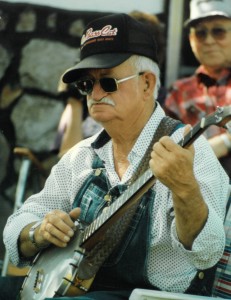
J. R. Johnston
Tragically, JR Johnston, one of McClurg Jam’s earliest members and well-known musicians, passed Friday May 10, 2019. He was a devoted banjo player, always eager to play anywhere in the Ozarks. JR attended the Old-Time Music, Ozark Heritage Festival every year with his life-long friend, Alvie Dooms. He will be greatly missed!
J.R. Johnston, a longtime resident of Norwood, Missouri, passed away May 10, 2019, at his home in Norwood, Missouri. J.R. was born March 13, 1929, south of Mountain Grove in Drury, Missouri, to Jason and Ollie (Smith) Johnston. J.R. attended school in the Drury area and at the age of eighteen moved to Iowa, where he worked at the Blackhawk Foundry and J.I. Case Company. During his time in Iowa, in 1951, he met and married Janet Borders, to whom he was married for 67 years. While living in Iowa, they had a daughter, Mary Ann. J.R. and his family moved to Oregon in 1955, where he worked at a sawmill. While living in Oregon, J.R. and Janet had a son, Herbie. In 1960, the family returned to Norwood, Missouri, where he remained until the time of his death. Upon returning to Missouri, J.R. drove a school bus for several years and owned and operated his own dump truck until retiring in 1990. J.R. enjoyed fishing, traveling, and was an avid bluegrass musician and fan. In the late 1970’s and earl 1980’s, J.R. played bass in a bluegrass band called “Misty Mountain Bluegrass.”
For many years J.R. and Janet attended many bluegrass festivals in several states and were regular attendees at the McClurg and Vanzant jam sessions, where he enjoyed playing old-time banjo. In 2017, J.R. was awarded the Pioneer of Missouri Bluegrass award, given for his support of bluegrass music. J.R. was raised in a Christian home and attended Norwood Baptist Church for many years with his family.
J.R. was preceded in death by his parents, Jason and Ollie Johnston, four brothers, Marion Johnston, Earl Johnston, Eugene Johnston, and Silas Johnston, and two grandsons, David Mason and Chris Mason. He is survived by his wife, Janet Johnston, of the home, one daughter, Mary Ann Mason and her husband, Billy, of Norwood, Missouri, one son, Herbie Johnston and his wife, Jeanie, of Norwood, Missouri, one granddaughter, Cassandra Ferguson and her husband, Tyler, of West Fork, Arkansas, two great-grandsons, Kyle Mason and Levi Mason of Mountain Grove, Missouri, one great-great-granddaughter, Aniston Mason and one great-great-grandson, Rydge Mason, both of Mountain Grove, Missouri, and many other friends and relatives who will greatly miss him.
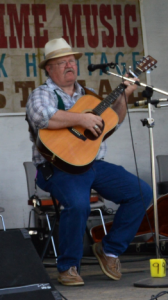
John Colbert
Our Festival family lost another long-time member May 4, 2019. John Hall Colbert III, of Willow Springs, MO, went to his heavenly home at the age of 65. The Colbert Brothers have opened the Saturday performances for many years, and John will be greatly missed. He had such a sweet spirit.
He was born on January 14, 1954, to Joseph Truett Colbert and Vernieca May (Easley) Colbert in St. Louis, MO. He graduated high school with the 1972 class of Willow Springs High School, and married Lorene Meador on June 16, 1990. John served in the United States military. He was honorably discharged when he was needed at home due to his father’s death. He retired from Missouri Department of Transportation. During his retirement, he was active in service with ARMSE, South Central Baptist Association and South Missouri Baptist Assembly. The joy of his life was preaching at small Baptist churches, including Nagle church, Flat Rock Baptist Church, and finally Mt. Pisgah Baptist Church in Hutton Valley, MO, where he served as pastor until his death. He loved serving as camp pastor at church camp at Van Buren, MO where many children called him “Uncle John.” He enjoyed spending time with his wife, hunting, fishing, and playing music with his six brothers, watching Willow Springs Bears football games, and traveling out West with his sister, nieces and nephews.
He is survived by his wife Lorene Colbert; seven siblings, Joe Colbert and Suzi of Gladstone, MO, Van Colbert and Carolyn of Willow Springs, MO, Leon Colbert of Willow Springs, MO, Vernon Colbert and Lisa of Willow Springs, MO, Bob Colbert of Willow Springs, MO, Mary Kellum and Robert of West Plains, MO, and George Colbert and Liz of Valley Park, MO; one sister-in-law, Wilma Biggers of Pratville, Alabama; one aunt, Mary Durham of Bakersfield, MO; several nieces and nephews, Heather Southwell and Prentice, Emilee Jensen and Chris, Levi Colbert and Katrina, Sarah Colbert, Vernieca Luerssen and Ryan, Andrew Colbert and Mary, Truett Colbert, Elisabeth Colbert, Aaron Biggers, Marlene Biggers, Matt Pigg, Kim Cochran, Angie Doi, Richard Pigg, Robert Pigg, Ryan Pigg, Stephanie DeWitt, and Teresa Barnhill; and two great-nieces.
Our lives are richer for having known him, and he will be greatly missed. His was described as a “life well-lived!”

Cathy Barton Para
The old-time community has lost a favored daughter. Local musician Cathy Barton Para, 63, of Boonville, passed away gently among family and friends at home, Wednesday, April 17, 2019.
Catherine Jean Barton Para was born June 12, 1955, in Fort Benning, Ga., to Claude D. and Mary Ruth Catlett Barton. An “Army brat,” she lived in Pennsylvania, Kentucky, Virginia and Hawaii before moving to Columbia in 1967. She attended West Junior and Hickman High schools and Stephens College, from which she graduated summa cum laude in 1977. She received a master’s degree in folklore from Western Kentucky University 1979. She married David Para at First Baptist Church in Columbia in 1979 and began a long and happy union with her lifelong love and fellow musician.
Cathy’s active interest in music began in elementary school in Hawaii and grew during her school days in Columbia. A champion banjo player, she also was one of the first hammered dulcimer players in the region and inspired many players nationally. Her playing was vibrant, and she was a generous and thoughtful teacher. She and Dave shared a musical career for more than 40 years, traveling the U.S. roads and rivers and Europe, specializing in traditional music from the Missouri – Ozark region. They were awarded by the Missouri Humanities Council, Young Audiences of Kansas City and the Folk Alliance Region Midwest. Stephens College named her a distinguished alumnus in 1993. In a fruitful 20-year collaboration with the late Bob Dyer, they produced three music albums related to Missouri history which were awarded by the American Library Association. They started the Big Muddy Folk Festival for the Friends of Historic Boonville. The 28th festival was held April 5-6. The couple made 16 albums.
Cathy performed as she lived, with her radiant smile, inviting laugh and unabashed joy, endearing her to the communities of home and career.
From friends:
Tenley and I are very sad that we lost such a good friend and bandmate last night. Cathy Barton was the kindest soul I have had the pleasure of knowing. She inspired me whenever we would play music. That inspiration will come alive every time I pick up an instrument. Your soul has soared but lives on through all of those you inspired to become better and love music like you did. Michael Fraser and Tenley Hansen of The Shortleaf Band
Cathy and Dave were undoubtedly the first live music I heard as a child and certainly the first clawhammer banjo playing I was exposed to. I often don’t share much about my musical influences, but I promise you that I would not be playing the banjo today if I had not heard Cathy play the banjo when I was a young child. She has left behind a wonderful legacy of traditional Missouri music for generations to come. Nathan Lee McAlister
Yours was a life truly well lived. The thousands upon thousands of people broken hearted today at your passing are so because of the great joy and love you gave them. We will continue to be influenced and delighted by you through memories, videos, and recorded music. Your name, music, and memory will simply never die. I bet heaven thundered with the souls happy to greet you on the other side. Judy Domeny Bowen
What a light Cathy has been and how dim the world will be in her absence. In the meantime, we recall how long and how well she’s been brightening our days. Missouri Folk Arts Program
Cathy Barton meant so many things to so many people. I will remember her always– her deep musical talent and infectious love of playing, her intelligence, articulateness, profound sense of compassion and empathy, and her wonderful sense of humor. “How she will delight the angels!” Julie Henigan
Cathy had a musical gift and the gift of making rare meetings seem like connecting with a lifelong friend. The old-time Missouri beacon burns a little dimmer today. Rest in peace, Cathy. The legacy you’ve left with us will last many more lifetimes than I’ll see. John P. Williams
The music world has lost a lovely voice, fabulous musician, and beautiful soul. Jan Hargraves

Dean Von Allmen
We lost a dear friend, Dean Von Allmen, this year. Dean passed away January 25, 2018 at the age of 92. Dean made many appearances at the Old-Time Music, Ozark Heritage Festival, as a performer and mentor.
Mr. Von Allmen was a World War II veteran serving in the United States Army from 1944-1946l; he served under General George Patton in the European Theatre and was assigned to the 94th Infantry Division. He was awarded the bronze star for his combat service. At the end of the war, he was transferred to the 1st Infantry Division and was stationed in Nuremberg, Germany where he was a prison camp guard. There he witnessed the historical Nuremberg Trials. After the war, Dean returned to Oregon County where he joined his brothers as a feeder pig buyer for eight years and later became a home builder and land developer. In 1976 he was elected and served as the Southern District Judge of the Howell County Court (now known as the Howell County Commission). As a small boy he developed what would become a life-long passion for playing the fiddle.
Mr. Von Allmen enjoyed many hours of playing with his many “music buddies” and played for numerous community events. In 2005 he placed second in the Missouri State Fiddling Championship competition. Dean served on Heart of the Ozark Bluegrass Association Board, the Howell County Farm Bureau Board and was a lifetime member of the Veterans of Foreign Wars Post 1828. Mr. Von Allmen enjoyed spending time at his farm at Rover, Missouri, especially hunting with family during deer season. He attended Faith Assembly of God Church in West Plains, Missouri.
He is survived by three children, Lee Von Allmen, West Plains, Missouri, Carolyn Meadow and husband, Darrell, Claremore, Oklahoma and Dennis Von Allmen and wife, Judy, West Plains, Missouri; eight grandchildren, Carma Wheeler and husband, James, Mike Von Allmen and wife, Dalia, Sherri Roy and husband, Mark, all of West Plains, Missouri, Shauna Millikin and husband, Jimmy, Claremore, Oklahoma, Douglas Meadow and wife, Cecily, Bristow, Oklahoma, Christa Garner and husband, Terry, Paden, Oklahoma, Katie Ferguson and husband, Dean, Festus, Missouri and Bryant Von Allmen, West Plains, Missouri; twenty great-grandchildren; four great-great-grandchildren; and several nieces and nephews.
CLIFF BRYAN
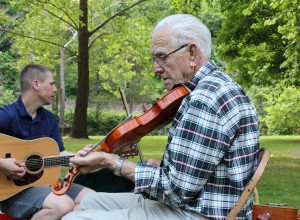
Long-time Festival supporter and friend, Cliff Bryan, passed away Sunday, March 12, 2017 at his home. Cliff’s talent and friendship is sorely missed.
Lisa Higgins, with the Missouri Folk Arts Program, writes:
We at the Missouri Folk Arts Program are going to miss him especially.
When we (Lisa Higgins and Debbie Bailey) took over as the MFAP team just over 17 years ago, our very first site visit to a Traditional Arts Apprenticeship Program team was with Cliff and his apprentice, the late Don Buedel. We all met at Cliff and Sue Bryan’s place in Pomona, in the kitchen of the farm house long in Cliff’s family. We had donuts, coffee, good conversation, and even better music. Just days later, the Bryans sold the farm to retire and moved to West Plains, where Cliff, friends, and apprentices spent many an hour playing old-time music in a new kitchen.
Cliff told us how he learned to play at age 14 on a fiddle his dad got “by trade.” A neighbor repaired the fiddle for 25 cents, and Cliff said “after I had that fiddle, nothing stopped me.” He played regularly at dances as a young man, and especially sought out Charlie Hiler, a local fiddler and friend who taught Cliff a regional “short-bow” style. Later, Cliff couldn’t play as often while he worked to raise his family, but came back to fiddling again, especially in retirement when he was able to play music every day.
Since his first apprenticeship in 2000 with Don Buedel, Cliff went on to teach five more apprentices in TAAP, our long-time project funded by the National Endowment for the Arts and Missouri Arts Council. From 2001 – 2017, Cliff taught Amanda Case; Jessica Collins; Rachel Reynolds Luster; Virginia Harden; and, most recently, Joel Hinds. Over the years, we’ve invited Cliff and friends to play at various venues, like the Missouri Capitol, Current River State Park, and Roaring River State Park, where audiences always enjoyed the music, almost as much as Cliff. He also often played at the Old-Time Music, Ozark Heritage Festival in West Plains, as well as at weekly music jams. He particularly liked having friends over to play in the kitchen, which he said “has a great sound.”
We will all miss Cliff, his music, and his friendship. Luckily, Jim Nelson had the foresight to record Cliff playing some favorite tunes; “Got A Little Home to Go To” is available from Voyager Records. Here at the office, we’re more than a little sad to know that we won’t pick up the phone and hear his voice: “It’s Cliff!”
His obituary reads, in part: Cliff was born August 31, 1927 at Kansas City, Missouri to Clifford Bryan, Sr. and Sibyl Goyer Bryan. On November 31, 1973, Mr. Bryan was married at West Plains, Missouri to Sue Ellis. He was a veteran having served with the United States Army during World War II. Before his retirement, Mr. Bryan was involved in real estate sales and was a long-time farmer. He had been recognized by the National Endowment of Arts Council, University of Missouri, for his short bow fiddle style of Bluegrass Music; he also had multiple students teaching them his short bow fiddle style of music. Mr. Bryan was a member of the Pomona Christian Church and had attended the First General Baptist Church of West Plains.
He is survived by his wife, Sue Bryan, of the family home; eight children, Kurt Lance, wife, Sharon, Gwen Walker, husband, Fred, Marletta Day, husband, Donnie, Marilyn Newkirk, husband, Joe, Becky Burns, husband, Brian, Gayle Cauldwell, husband, Mike, Tom Foust, wife, Suzanne and Cheryl Foust; sixteen grandchildren; nine great-grandchildren; one brother, Bob Bryan, wife, Nancy; two sisters, Martha Carter and Maxine Casey; and several nieces and nephews.
His parents, three sisters and two brothers, precede him in death.
More about Cliff from the Missouri Folk Arts Program online exhibit, Master Artists; Master Teachers
http://mofolkarts.missouri.edu/exhibits/artists/bryan.shtml
Cliff was featured in an article about “creative aging,” written by Barbara Alice MacRobie for the Missouri Arts Council: https://www.missouriartscouncil.org/…/105de3a28a36.pdf
RICK COCHRAN

A lifelong resident of West Plains, Richard Morrison “Rick” Cochran, son of the late Russell Van and Dulcie Morrison Cochran, was born July 24, 1941, at Cottage Hospital and surrendered his soul to Heaven’s keeping January 6, 2015.
In addition to his family, the loves of Rick’s life were hunting, fishing and guitar picking. As a young man, he developed a reputation as one of the area’s most savvy turkey hunters, spending countless pre-dawn hours in the woods long before the season opened, honing his calling technique while tracking the elusive birds’ movements. The many gobbler beards displayed on the walls of his music room are a testament to his skills as a hunter. His dad was also an avid outdoorsman, and the two of them kept the family supplied with a bounty of quail, dove, turkey, venison, wild duck and fish.
Rick and his brothers shared a great admiration for Chet Atkins that inspired all three to become guitar players. The Cochran brothers made numerous trips to Nashville together to spend time with their hero and indulge in various adventures, often attending the annual meeting of the Chet Atkins Appreciation Society with close family friend, Dennis Crider. His store, Rick’s Music, a fixture on The Square in the 1980s, was a picker-friendly meeting place for professional and amateur musicians alike. Weekly Thursday night jam sessions in Rick’s at-home music room were a long-standing local tradition that included musicians from all around the area. Rick welcomed one and all, from young beginners with hand-me-down acoustics to virtuoso guitar, fiddle and banjo players, giving them a space to share and enjoy making music for the pure fun of it.
A 1963 graduate of Arkansas State College, Rick taught biology at MSU-West Plains for nearly 30 years, making a lasting impact on thousands of students with his unpredictable teaching style and an ability to make learning easy, enjoyable and applicable to real life. The year of his retirement he was keynote speaker at the university’s commencement ceremony. In his speech he used the metaphor of growing gourds (one of his hobbies) and how every gourd is different to illustrate the path to a fulfilling, individual life. When the graduates accepted their diplomas, each one also received a packet of gourd seeds with written instructions for how to sprout them.
Rick was a creature of habit, and for many years you could find him eating lunch at the original Ozark Café on Washington Avenue or the Red Apple Grill on The Square. Waitresses all over town knew that Picky Ricky, as he came to be known, wanted his “toast burnt” and his “milk cold.” Wherever he went he was glad to shoot the breeze with friends and strangers alike.
Rick’s generosity shone most brightly at Christmastime, when he often bought gifts in bulk (one year buying nearly 100 Daisy Red Rider BB guns), distributing them to friends and family with glee. Endearingly eccentric, Rick was exceptional in most every way, and his life was filled with learning and humor. He was a part of the spirit of his beloved hometown, and greatly loved. His like will not be seen again.
“From the time of “Squid” Davis at the old high school, Rick has been a fascinating and charming friend, and will not soon fade from memory. He was a “character” with deep personal real character, and a massive asset to our community. A true educator and not just a teacher-talker, Rick revered knowledge and critical thinking and leaves a deep footprint wherever he has walked. If the turkeys he has dispatched went to heaven, he is deep in feathers.” R. Jack Garrett
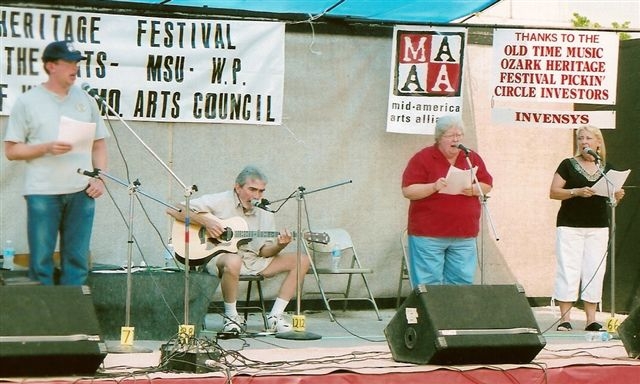
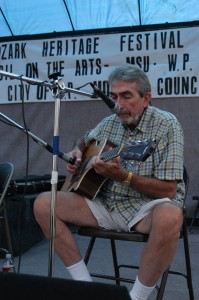
DON GRAVES
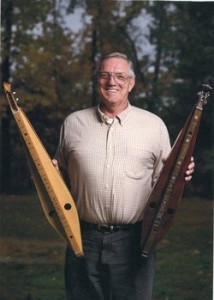
Don Graves, a master artist of old-time dulcimer and a dulcimer luthier from Lebanon, Missouri, died on Monday, April 14, 2014. Born in Phillipsburg, Missouri in 1942, Don hailed from a musical family, the son of the late Bill Graves, with whom Don and his sisters Daisy and Vivian played old-time music at festivals in Missouri and beyond. The family made many appearances at the Old Time Music, Ozark Heritage Festival here in West Plains.
Missouri Folk Arts Program staff posted, “We join Don Graves’ family and friends in mourning the loss of such a kind and talented man. We will miss your music, your voice, and your smile.”
Don taught old-time dulcimer music in Missouri’s Traditional Arts Apprenticeship Program in 2010 and 2011. During his participation in TAAP, Don performed at Missouri’s capitol and at the Old-time Music, Ozark Heritage Festival.
Don was titled “The Docent of the Walking Cane Dulcimer” in a 2011 Rural Missouri article written by J. Jenkins. “My dad, Bill Graves, played it ever since I can remember,” says Donald. “He learned to play it from my grandmother, and she learned from her father, John Mawhee, my great-grandfather. Dad played it for 75 years. When he passed away, I picked it up myself.”
Don was passing the tradition to his grandchildren. Don said, “It means more to me than anybody would ever know.” And the grandchildren replied, “For him to make us these instruments and teach us these songs, it shows us how much he loves us.”
As stated in the Rural Missouri article, it’s a love that has been passed down from generation to generation through the music. “When I play, I go back in time,” Donald says. “Sometimes, I can hear Dad playing and singing while I play and sing. It takes me back, and I’ll forget where I’m at. The more I play it, the more I enjoy it.”
Don leaves behind his wife, Diana; son Brian; daughter Toni (Jackie); brother John; and sisters Daisy, Vivian, Melissa, Pam and Debbie; four grandchildren, and a large extended family. The family plans to continue the tradition of dulcimer playing, and we hope they will be available to perform at the Festival in years to come.
In 2007-08, MFAP, the Missouri Arts Council, and Exhibits USA featured Don along with five other luthiers in the traveling exhibition “Work is Art and Art is Work,” which is available to view at the Missouri Folk Arts Program’s website.
A video on Missouri Folk Arts Program Facebook page gives us a minute of Don Graves and sister Daisy Dame playing the tune, “It was Sad When that Great Ship Went Down” at the 2010 Old-Time Music, Ozark Heritage Festival.
Follow this link to a video of Don Graves’ Dulcimer Workshop at the West Plains Council on the Arts’ Old-time Music, Ozark Heritage Festival in 2007.
DON BUEDEL
Old-Time Music, Ozark Heritage Festival organizers saddened to learn of passing of one of its founders
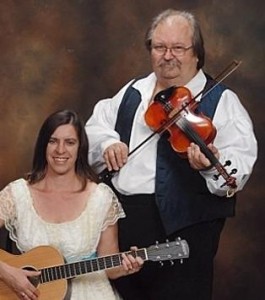
WEST PLAINS, Mo. – One of the founding fathers of the Old-Time Music, Ozark Heritage Festival in West Plains, Mo., multi-instrumentalist Don Buedel, passed away peacefully in his sleep June 6, 2013, at his home in Murphysboro, Ill.
Buedel and his wife, Lori, were scheduled to perform on the main stage at this year’s festival, set for Friday and Saturday, June 14 and 15, in and around the West Plains Civic Center and along East Main Street. Organizers said they are working to fill the Buedel’s performance time and Don’s workshop times and will announce the changes as soon as they are made.
From the first festival in 1995 and through all 19 years of its evolution, Buedel was a major factor in its mission and success, festival organizers said. “While some musicians play old-time tunes very well, they tend to isolate the music from the lives of the tradition bearers who have preserved this music so we can, in this age enjoy it as well,” he has been quoted as saying. “I think it’s important to remember the people, as well as the music. Without the people, there would be no music.”
“All of us involved with the festival were deeply saddened to hear of Don’s passing,” organizers said. “Don has been such an integral part of this event from the very beginning, helping to shape its purpose and supporting its mission through his own performances every year. The work he has done to preserve and pass down the musical traditions of this area is immeasurable and incalculable in its worth. We feel privileged to have known him and worked with him so many years. To say he will be sorely missed is truly an understatement.”
A professional clock maker by trade, Buedel ran a small clock repair business, Shawnee Cottage Clock Company, in Murphysboro, but his avocation, passion and special gift was his music. He started playing in bluegrass and old-time string bands in his hometown of Springfield, Ill., at a young age and was a multiple fiddle contest champion in recent years. He and his wife, Lori, performed at many festivals and historical settings, including the Old-Time Music, Ozark Heritage Festival, and the Clayville Historic Site near Springfield, Ill.
He was a lead member of the Smoky Hollow String Band of Murphysboro and also had played with the Colbert Brothers of Willow Springs, Mo., and the Wolf Creek Possum Poachers. In his youth, Buedel toured Germany with William Furry, now director of the Illinois Historical Society, accompanying the International Folk Dancers.
While residing in the Missouri Ozarks in the 1990s, Buedel, with support from the Missouri Folk Arts Program, collected and learned tunes from longtime traditional musicians, including Howe Teague and Howell County fiddlers Charlie Hiler and Cliff Bryan, in order to teach their repertoire to others.
Buedel’s philosophy may have been best reflected in the following quote offered by members of the Smoky Hollow String Band on June 9, 2013. Band members said Buedel loved this description by Don Borchelt of his great passion – a good fiddle tune:
“A fiddle tune is a melody that, once you hear it, you can’t seem to get it out of your head until you can grab your banjo and learn it yourself. A fiddle tune is a living cord connecting us back to long ago generations, to feel deep in ourselves just a fragment of feeling transmitted from across the ages by some plain common folk, our ancestors otherwise long forgotten. A fiddle tune is a kind of tune that has a lot of music concentrated in just a little bit of space, and in that respect it is to notes what poetry is to words. A good fiddle tune you can play for a very long time and not get tired of it. A good fiddle tune is a tune that you can never quite play the same way twice, even when you want to. A good fiddle tune will bring two or more people together who might otherwise be enemies. Fiddle tunes all pretty much sound the same, except they all sound different when you finally hear them. A good fiddle tune will always be remembered by somebody. And a good fiddle tune will make you forget, for just an instant, that man is born to die.”
Buedel is survived by his wife, Lori; mother, Evelyne Buedel, who resided with them in Murphysboro; two sons, Josh and Clay Buedel, both of St. Louis, Mo.; a daughter, Layla Rismoen, and husband Greg, Minneapolis, Minn.; two grandchildren, Gibson Buedel and Elsa Rismoen; and his sister, Gina Vespa and husband Jim, Athens, Ill.
He was preceded in death by his brother, Leo Buedel Jr., who lived in Bradenton, Fla., and his first wife, Betsy Buedel, originally from Willow Springs, Mo.
A memorial service and celebration of life for Don Buedel is scheduled for 1 to 3 p.m. Saturday, June 15, 2013, at the General John A. Logan Museum, 1613 Edith St., in Murphysboro, Ill. A memorial page has been set up by his family.
JIM LANSFORD
Old-Time Music, Ozark Heritage Festival
Loses Long-time Performer Jim Lansford
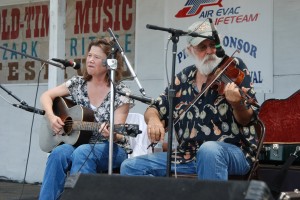
Jim Lansford, who with his wife Kim, played at the Old Time Music Festival since its early days at the H.O.B.A. Park, left us October 30, 2012. Together they were among the finest practitioners of the old-tie style of duo singing to be found. Jim’s prowess on the fiddle, guitar, banjo and mandolin was superbly complimented by Kim’s innovative and meaty guitar playing, and when they sang, their voices blended together to provide a feast for the ear, as well as the heart. He will be greatly missed. Kim continues to perform and still resides at the family farm in Galena. Missouri.
